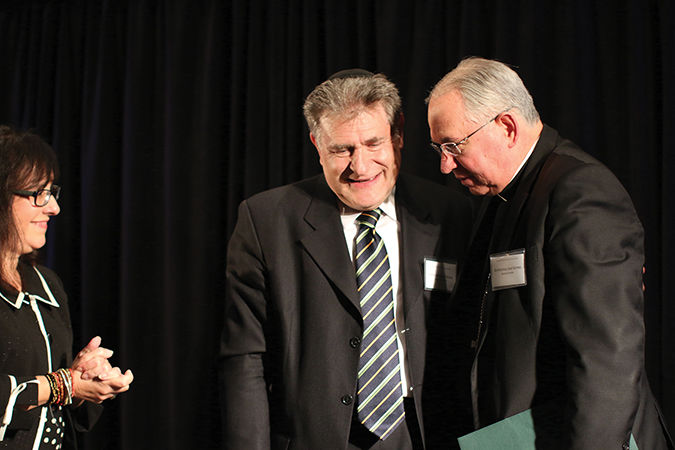Rabbi Abraham Skorka is an Argentine chemist, author and rector of the Seminario Rabínico Latinoamericano Marshall T. Meyer — which trains Masorti/Conservative rabbis, cantors and educators in the Latin American Jewish Community.
He’s also Pope Francis’ best friend.
The rabbi, joined by Archbishop José H. Gomez, addressed the importance of interfaith dialogue during a Jan. 22 lecture at Loyola Marymount University.
“All acts of violence and barbarism reflect the bankruptcy of a culture, and when religion is a constitutive component of that culture, it reflects the failure of its course of action,” Rabbi Skorka said.
“The heartbreaking world of the present, in which the demonization of the other is so common, the step before their obliteration, requires dramatically, an answer to its crisis,” he added.
Interreligious dialogue, the rabbi said, can ensure that “every person will see a brother or sister in the other.” He engages in this kind of dialogue with Pope Francis. Part of that dialogue is available in the book “On Heaven and Earth,” a book co-authored by the rabbi and the pope.
“We understood dialogue not simply as an act of kindness the one toward the other, but rather in carrying out actions that require courage and daring, with the hope of carving out, as much as we can, a turn in history,” Rabbi Skorka said.
In his remarks, Archbishop Gomez stressed that the understanding of who we are as human beings is fundamental.
During the question and answer period, the archbishop said that Catholics often fear interreligious dialogue, but the time has come to put that fear aside. To do that, we must no longer simply be “cultural Catholics,” but Catholics that have a profound understanding of the faith.
“Jesus constantly tells us to not fall into fanaticism,” the archbishop said. “We must live constantly knowing the presence of God. Knowing that presence, we will be drawn to others, including the marginalized.”
We must learn to pray for peace and learn to act as the children of God, he said.
Father Alexei Smith, ecumenical and interreligious officer for the archdiocese, noted how serving the poor resonates between both faith communities.
“We are challenged to grow in our respect for the other, and the dignity of the individual,” he said of interreligious dialogue.
It’s not a question of denying the differences, but of “opening yourself to the other to be enriched by each other, and then going forth as men and women created in the image and likeness of God,” Smith said.
Rabbi Mark S. Diamond, director of the Los Angeles region’s American Jewish Committee, noted that 2015 marks the 50th anniversary of the Second Vatican Council’s Nostra Aetate, which deals with the Church’s relationship to non-Christian religions.
“Our convocation this evening is a visible manifestation of the remarkable progress we have attained in our interfaith and intergroup discourse,” he said. “We are mindful of the long, difficult road we have traveled in Catholic-Jewish relations, and the challenges that lie ahead.”
Rabbi Diamond also invited those gathered to a special celebration of Nostra Aetate at the Cathedral of Our Lady of the Angels, 7:30 p.m., Feb. 17. He couldn’t pass up the opportunity to mention it, he said, because it’s not everyday a rabbi gets to invite people to a cathedral.

